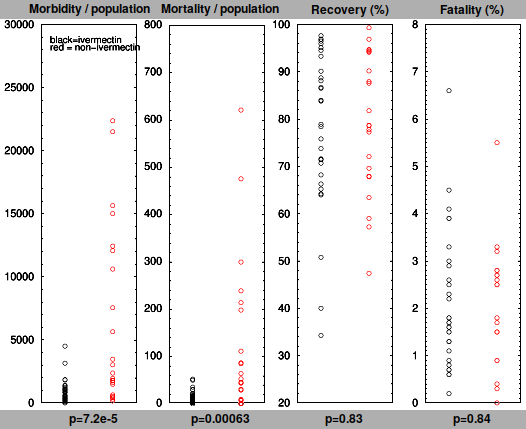 preprint
on MedRxiv (Tanioka et al.) comparing countries that supposedly used
ivermectin with those that didn't is being widely promoted on the Internet as
evidence that ivermectin is a highly effective treatment for COVID-19. In this
article, we look more closely at the numbers to see what they really show.
preprint
on MedRxiv (Tanioka et al.) comparing countries that supposedly used
ivermectin with those that didn't is being widely promoted on the Internet as
evidence that ivermectin is a highly effective treatment for COVID-19. In this
article, we look more closely at the numbers to see what they really show.
The graph below was drawn from the tables in the paper. Morbidity / population is reported COVID cases per million population. Mortality / population is reported COVID deaths per million population. Fatality % is percent of cases that died, i.e., 100 × mortality / morbidity.

Morbidity and mortality of 31 countries in Africa assumed to be using ivermectin and 22 assumed not to be using ivermectin (redrawn from the tables in Tanioka et al.). Overall life expectancy was 60.7 in the 'ivermectin' group and 66.4 in the 'non-ivermectin' group. This was also highly statistically significant (p=0.00048).
This paper has a fatal flaw: the authors did not gather any statistics for ivermectin. They simply assumed that patients in countries the WHO declared to be onchocerciasis-endemic were all taking ivermectin. Maybe some of them were, and maybe they were the same patients that didn't get COVID, but for many reasons we can't assume this.
Looking at the graphs from right to left, it is clear that in countries assumed to be taking ivermectin there was no difference in COVID recovery rate or fatality rate (p=0.84), but a highly significant difference in reported COVID mortality rate (p=0.00063) and morbidity rate (p=7.2×10−5). In other words, if someone got COVID they were just as likely to die from it in either group. This tells us the following about onchocerciasis-endemic countries:
- The overall health is lower.
- The probability of dying or recovering if you catch COVID is no different.
There is also high variability. The eight non-endemic countries with higher reported COVID mortality rates (South Africa, Tunisia, Eswatini, Libya, Morocco, Cabo Verde, Namibia, and Mauritania) had 44.6-fold higher COVID mortality than the six non-endemic countries with the lowest reported mortality rates. The lowest, Seychelles, has zero deaths per million. The highest, South Africa, has 621.4. Egypt has the highest case fatality rate among non-endemic countries at 5.5%. Sudan has the highest among endemic countries at 6.6%; Burundi has the lowest at 0.2%.
What could be going on? There is a graph here showing that the lower-mortality countries are located in the equatorial regions of Africa, while the higher-mortality regions are located in the northern and southern extremes. So there are four possibilities:
- The rate of COVID transmission or infection could be lower in the equatorial countries.
- There could be genetic differences in susceptibility in the two regions.
- Reporting could be more inaccurate in the endemic countries.
- The same factors that cause shorter life expectancy could also reduce the rates of reported infection and mortality. For instance, the endemic region could have lower quality health care.
Two essential facts are not discernible from the Tanioka et al. paper: (1) Are the persons taking ivermectin the same as the ones who did not get COVID? and (2) What percentage of those in the 'endemic' countries actually took ivermectin?
The article appeared on MedRxiv almost six months ago, but still hasn't shown up in print. That suggests it's still stuck in peer-review. If I were to peer-review it, I would say the authors need a better measure of ivermectin intake than whether the WHO declares a country as onchocerciasis-endemic or not. For all we know, the reason it's endemic in those countries could be a lack of ivermectin intake. (In fact, this is almost true by definition.)
Another mystery is this: how can a drug cure a disease at concentrations 1/60 of the concentration required to prevent viral replication? We can't just brush off inconsistencies like this.
Ivermectin is a very safe drug, and it's great that people are reading the scientific literature and pointing out things that doctors may have overlooked. It's unconscionable that the general public cannot get ivermectin if they believe it will help them. The only effect of blocking it and insulting those who wish to use it is to create suspicion about the government's motivation.
But what the Tanioka paper does not show is that ivermectin is able to cure COVID. If it did, the death rate as a percentage of cases would be lower. What it actually shows is that countries where ivermectin might be assumed to be more widely distributed, fewer COVID cases and fewer deaths are reported. It doesn't mean ivermectin does or doesn't work. There are just not enough data to answer the question.
If ivermectin is doing anything in those countries, it's almost as if it's acting like a—gasp—vaccine. If the US government ever sees this graph, they might figure that out. Then they'll probably start trying to force the ivermectin-hesitant to take it. Maybe we should give 'em some reverse psychology: if you want the gov't to make ivermectin available, start claiming you won't take it no matter what.
sep 17 2021, 3:36 am
